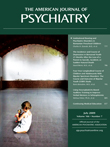More Aggressive Treatment for Depression?
To the Editor: In the April 2009 issue of the Journal, Robert M. Carney, Ph.D., and Kenneth E. Freedland, Ph.D. (1) noted that depressed patients in an intervention group who did not experience treatment response had a higher risk of late mortality (which was described as incidence of death ≥6 months following acute myocardial infarction) compared with patients who responded to treatment. The authors pointed out that this relationship was not significant in the usual care arm of the study. They also reported that in the intervention group, there was a lack of improvement, although subjects received 6 months of aggressive treatment. However, only approximately 15% of patients in the usual care group received any form of nonstudy treatment during the first 6 months. Among patients in the usual care arm who did not experience improvement, less than 15% had received any treatment for their depression.
Drs. Carney and Freedland stated that it is not immediately evident why major depression that is not responsive to treatment is associated with a higher risk of cardiac-related mortality and morbidity and concluded that major depression may warrant more aggressive treatment.
It seems to me likely that less improvement of depression would tend to lead to more aggressive treatment. Perhaps, at least in part, the explanation for why the greater risk of cardiac-related morbidity and mortality is “not immediately apparent” is because we do not wish to think that our efforts at treatment, even aggressive treatment, might have harmed our patients. Psychotropic drugs certainly do affect other organ systems—and not always beneficially. A more apt conclusion might be that less aggressive treatment is better, at least with regard to the treatments that were used in the study, while we search for different treatments, a search that the authors rightly advocate.
1. Carney RM, Freedland KE: Treatment-resistant depression and mortality after acute coronary syndrome. Am J Psychiatry 2009; 166:410–417Google Scholar



